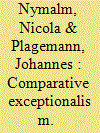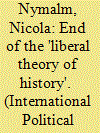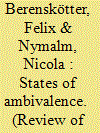|
|
|
Sort Order |
|
|
|
Items / Page
|
|
|
|
|
|
|
| Srl | Item |
| 1 |
ID:
164450


|
|
|
|
|
| Summary/Abstract |
Existing research on exceptionalism in foreign policy suggests a number of confrontational features making it a threat to peaceful international relations. Largely based on US and European cases, and hardly ever taking a comparative approach, this literature overlooks a variety of exceptionalisms in non-Western countries, including so called “rising powers” such as China and India. A comparison between exceptionalist foreign policy discourses of the United States, China, India, and Turkey shows that exceptionalism is neither exclusive to the United States, nor a “new” phenomenon within rising powers, nor necessarily confrontational, unilateralist, or exemptionalist. As a prerequisite for comparative work, we establish two features common to all exceptionalist foreign policy discourses. In essence, such discourses are informed by supposedly universal values derived from a particular civilization heritage or political history. In order to systematize different versions of exceptionalism, we then propose four ideal types, each of which reflects exceptionalism's common trait of a claim to moral superiority and uniqueness but diverges across other important dimensions, with implications for its potentially offensive character. The article concludes by formulating a research agenda for future comparative work on exceptionalist foreign policy discourses and their repercussions for great power relations and global politics.
|
|
|
|
|
|
|
|
|
|
|
|
|
|
|
|
| 2 |
ID:
127055


|
|
|
|
|
| Publication |
2013.
|
| Summary/Abstract |
Over the last 10 years, economic issues related to currency policy have become the major ongoing dispute between China and the United States. Specifically, the US Congress has demanded a tougher policy to avert the negative consequences of "unfair" Chinese policies-in the form of a "manipulated currency"-for the US economy. Building on an analytical framework of discourse theory (DT)-and proposing a method for applying DT in empirical research-an investigation into congressional debates on the Chinese currency shows that the question is not a purely economic one, but rather that it reflects a dislocation of US identity as the vanguard of liberal-democratic capitalism. This dislocation involves changes to how "liberal" identity in the US Congress is articulated in relation to the role attributed to "illiberal" China, which in turn affects the formulation of US China policy in Congress.
|
|
|
|
|
|
|
|
|
|
|
|
|
|
|
|
| 3 |
ID:
179318


|
|
|
|
|
| Summary/Abstract |
This article revisits and revives the concept of ‘the Stranger’ in theorising international relations by discussing how this figure appears and what role it plays in the politics of (collective) identity. It shows that this concept is central to poststructuralist logic discussing the political production of discourses of danger and to scholarship on ontological security but remains subdued in their analytical narratives. Making the concept of the Stranger explicit is important, we argue, because it directs attention to ambivalence as a source of anxiety and grasps the unsettling experiences that political strategies of conquest or conversion, including practices of securitisation, respond to. Against this backdrop, the article provides a nuanced reading of the Stanger as a form of otherness that captures ambiguity as a threat to modern conceptions of identity, and outlines three scenarios of how it may be encountered in interstate relations: the phenomenon of ‘rising powers’ from the perspective of the hegemon, the dissolution of enmity (overcoming an antagonistic relationship), and the dissolution of friendship (close allies drifting apart). Aware that recovering the concept is not simply an academic exercise but may feed into how the term is used in political discourse and how practitioners deal with ‘strange encounters’, we conclude by pointing to alternative readings of the Stranger/strangeness and the value of doing so.
|
|
|
|
|
|
|
|
|
|
|
|
|
|
|
|
|
|
|
|
|